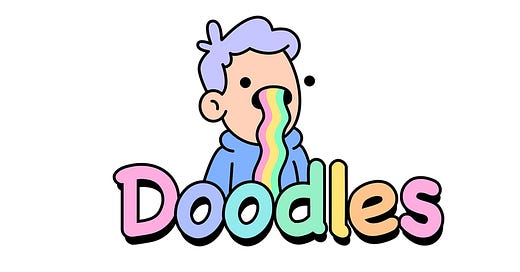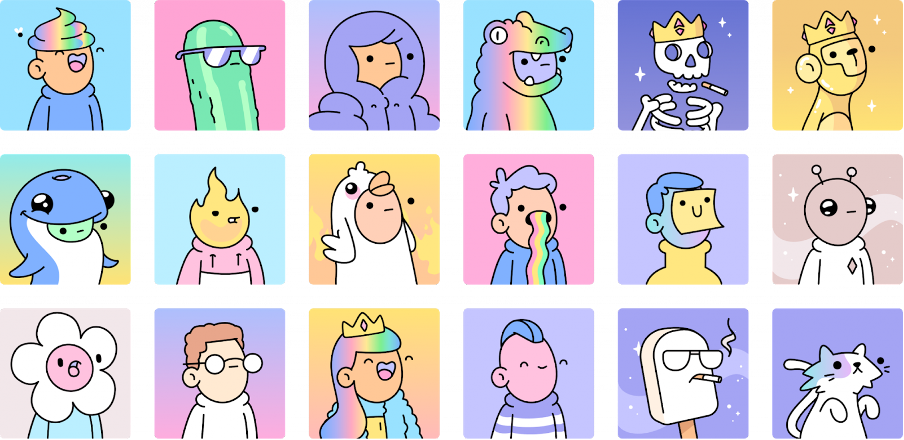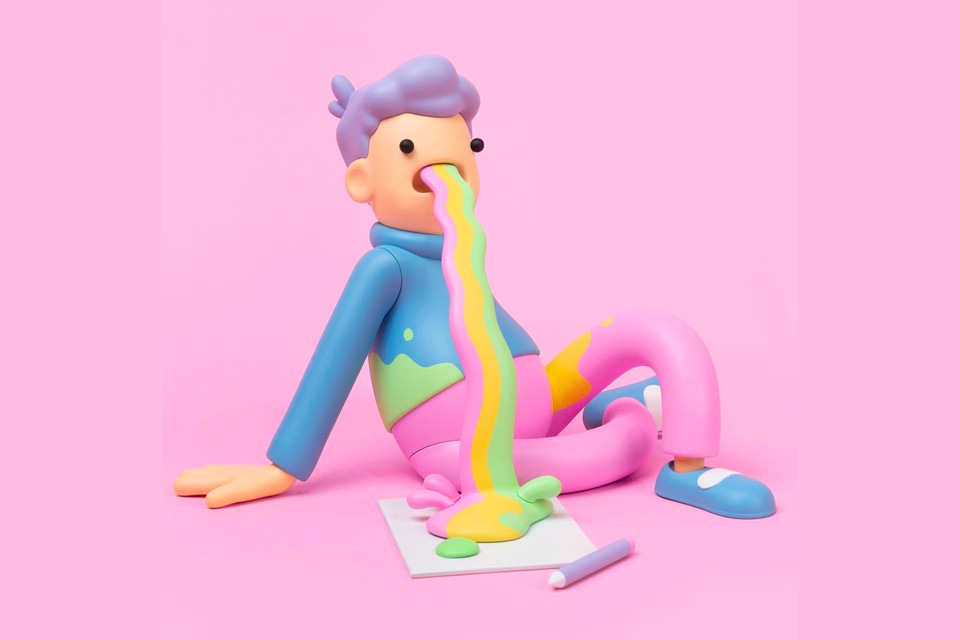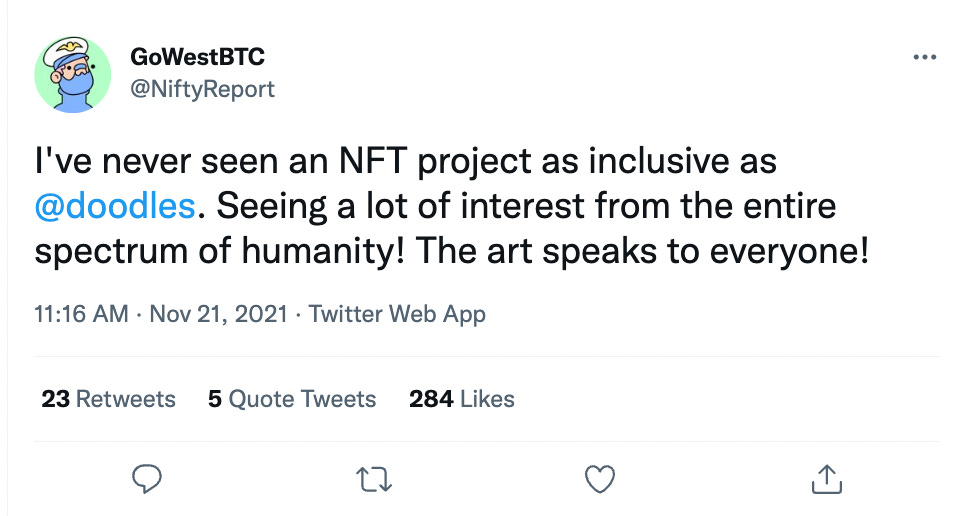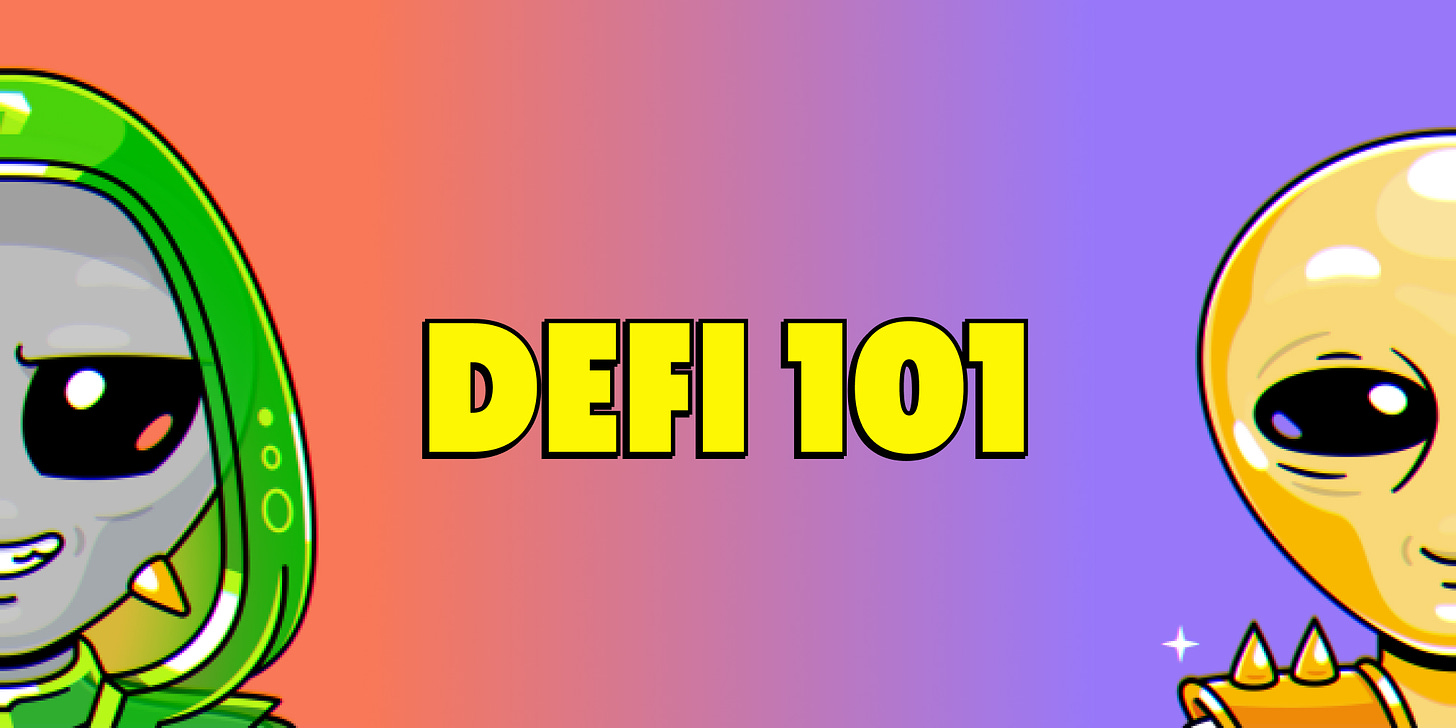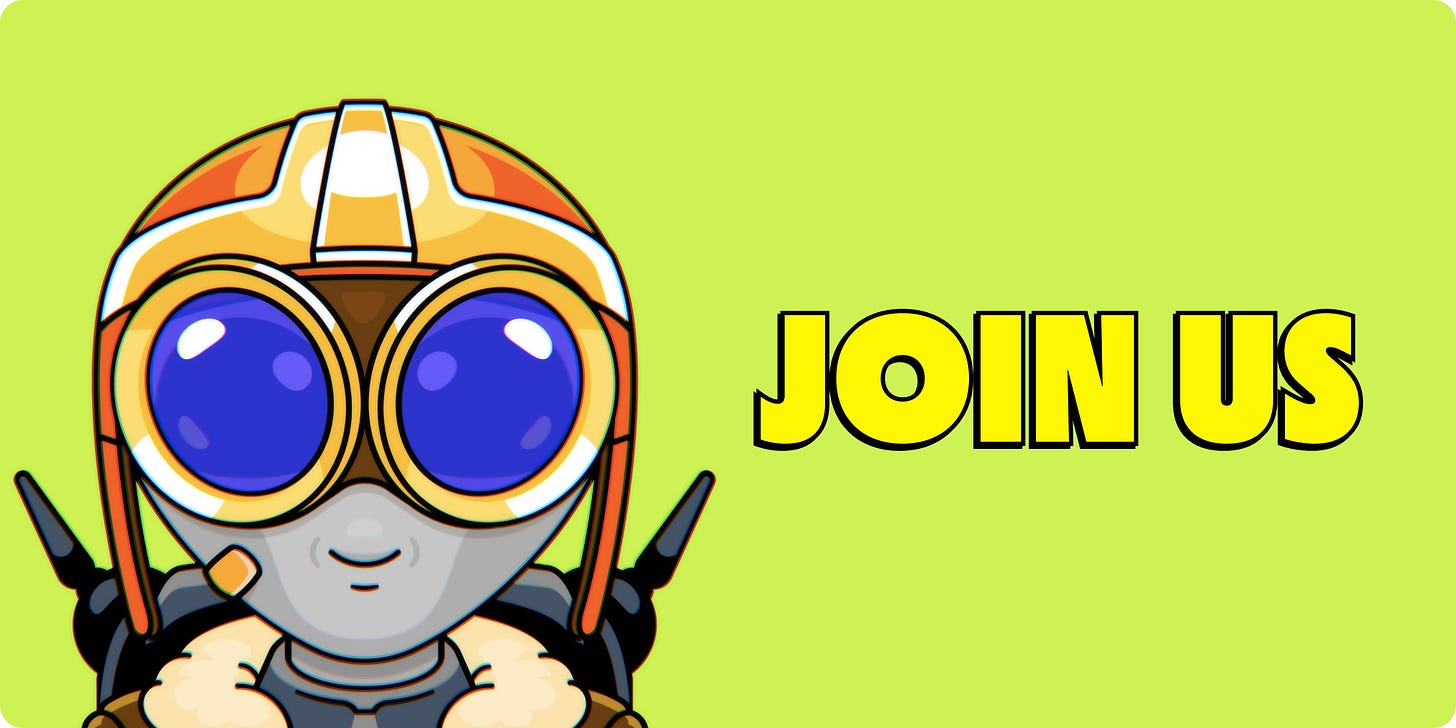👋 Welcome to the fourteenth issue of The Syllabus from Invisible College – a weekly newsletter that will help you navigate the complex world of web3. To get this newsletter delivered to your inbox, subscribe here:
Before we begin, a disclaimer – nothing here is financial advice. We’re analyzing projects that we find interesting in the hope that you’ll enjoy learning about them as well. With that, let’s dive in.
"The art is the hook. The art gets people to look and explore. My goal is to trojan horse millions of people into blockchain through our brand."
- Jordan Castro, founder – Doodles.
In the six months since Doodles launched in October 2021, the 10,000-piece generative NFT collection has experienced a steady ascent into blue-chip territory. With over 100,000 ETH in secondary sales volume, its mint price of 0.123 ETH has ballooned into a current floor price of 15 ETH.
While it’s hard to pinpoint why some NFT projects do better than others, we've identified four factors that seem to have contributed to the project’s success.
1. A blue-chip team
The initial public response to an NFT project is largely driven by the founding team's track record. And it would be tough to match the experience of the Doodles team.
Jordan Castro has been building in the crypto space since 2012. His first major project was a gamified prediction market for betting on the price of Bitcoin and Doge. After a short successful run, the market was hacked. Jordan shut it down, refunded users, and learned an expensive lesson about security.
But he wouldn’t be out for long.
In 2017, CryptoKitties became the first NFT project to capture the public's attention and usher in the dawn of art NFTs that we're so familiar with today. Fascinated by the mechanics of the game, Jordan became a full-time CryptoKitty breeder (if that sounds strange now, imagine what it sounded like in 2017). His breeding experience led him to create a product that helped breeders find probabilities of certain traits appearing in the breeding process. The product took off, and attracted the attention of the team at Dapper Labs – the company that runs CryptoKitties, NBA TopShot, and many other web3 projects. They offered Jordan a spot on their team.
From April 2018 to October 2021, Jordan served as the product lead at CryptoKitties. His tenure there overlapped with Evan Keast – the CryptoKitties marketing lead from March 2018 to October 2019. In 2021, Jordan and Evan teamed up with Scott Martin, an illustrator with over a decade of experience, to launch Doodles. Together, they leveraged their learnings from Dapper Labs about building hype, managing community, and creating valuable intellectual property.
2. Artwork with attractive, easily transmissible vibes
In the realm of PFP NFTs, aesthetics and vibes are crucial to mass adoption.
Doodles’ playful friendly vibe can be captured at first glance. The collection is designed to be inclusive, spanning a large spectrum of colors and character types. On the whole, a Doodle leaves little room for negative interpretation, making it an ideal PFP for a person looking to highlight their approachable nature.
3. A carefully cultivated community backed by a strong treasury
In the early days, the core team was extremely active on Discord, ensuring that community members would hear the vision of the project directly from its creators and get one-on-one time with them.
Their decision to lock the Discord down before the mint created hype and the relatively high mint price of 0.123 ETH was met with strong demand. The collection sold out in minutes.
The successful launch enabled its founders to commit 420 ETH to the treasury, also known as Doodlebank. Besides this initial deposit, the treasury also receives 2.5% of every secondary Doodle sale. As of today, Doodlebank continues to be well funded with over 1,700 ETH (~$5.2 million).
Community members can submit proposals for how to allocate treasury funds. Most proposals include ideas for experiences, derivative artwork, contributions to relief funds, or budget allocations for expanding the Doodles team.
4. Controlled Decentralization
Unlike some web3 projects that favor decentralization at all costs, the Doodles team has taken a more centralized approach to brand building.
In stark contrast to the popular trend of CC0, Doodles holders have limited usage rights for their NFTs. They’re only allowed to merchandise their Doodles for up to $100,000. These limited rights include the ability to sell physical merch featuring their Doodle or the use of the full image of their Doodle in a piece of art that they create. All other rights, including the right to create 3D versions of a Doodle, are reserved by Doodles LLC.
The core team invites proposals from owners who wish to use their Doodles in ways that aren’t explicitly permitted and works with them to develop mutually beneficial solutions for both the community member and the brand. While this approach is less likely to lead to serendipitous spikes in hype and attention, it lends itself well to the stable long-term growth of the brand. Eventually, they hope to increase the level of decentralization, but they’re taking a more measured approach to getting there.
What’s next for Doodles?
The long-term vision of Doodles is to evolve into a brand that onboards millions of people into web3. That’s not an easy task, but in the past few months, they've already taken steps in that direction.
Bringing web3 into the real world
At Art Basel Miami, the Doodles team held a large-scale event featuring a gallery, merch, and live performances. At SXSW, they set up an interactive exhibit in partnership with Shopify. It was open to the public but offered special experiences and exclusive merch for NFT holders. Given their long-term goal, Doodles holders can expect more IRL experiences like these.
Expanding access without diluting supply
The latest Doodlebank proposal details a plan to create a new collection of NFTs that can be purchased via credit card. These NFTs will be linked to existing Doodles, and holders will be able to license their existing Doodles to the Doodles team for the mint.
In return, they’ll receive a share of the revenue from the sale of the new NFTs. This approach should allow new entrants to use traditional financial instruments to buy into the Doodles franchise while still rewarding early adopters.
Experiences powered by wrapped NFTs
The team recently launched a derivative project called Space Doodles, that allowed NFT holders could convert their static Doodles into animated versions traveling through space. So far, about 50% of Doodle holders have sent their Doodles to space.
They achieved this feat by creating a contract that ‘wrapped’ Doodles into a different token, without creating copies of existing Doodles. Space Doodles can also be unwrapped and returned to their original form at any point. Think of it like a character that dresses up for a particular role.
A blockchain-based game
The latest Doodlebank proposal to pass also included a request to use treasury funds to expand the Doodles team. Interestingly, they are looking to hire a lead game designer and a lead token economy designer. It wouldn’t be too far-fetched to assume that a Doodle-based game is on the horizon.
Want to learn more?
Visit the Doodles website to learn more about the project
Read their public docs to dive even deeper
Check out the Doodles collection on OpenSea
DeFi 101
Thursday, April 28th, 6:00 PM PT
Decentralized Finance (DeFi) is unlocking new ways for ordinary people to put their money to work.
In this free 1-hour crash course, Invisible College faculty member, Rockwell Shah will share:
How DeFi works
What you can do with DeFi
Low-risk ways you can earn a higher yield on your money
At the end of the session, we'll even walk you through how you can stake on Anchor and earn a 19.42% APY on stablecoins.
This event is open to the public. To join, register here.
Other projects we’re exploring
Rario – An NFT marketplace that is building NBA Topshots for Cricket
Stargate Finance – An omnichain DeFi protocol aiming to simplify cross-chain liquidity transfers
Ice Poker – A play and earn poker game in the metaverse
Invisible College Recommended Reads
NFTs and a Thousand True Fans | 4 minute-read
Chris Dixon’s post examines the implications of NFTs on the creator economy as described in Kevin Kelly’s seminal essay – 1,000 True Fans.Crypto’s Business Model is Familiar. What Isn’t is Who Benefits | 5-minute read
A piece by Jesse Walden that explains how the principal innovation of crypto networks is their ability to grow network effects by enabling users to share in the value they create.Crypto is Bad for (Bad) Businesses | 2-minute read
A sub-section of 2022 Messari’s Crypto Theses report. Scroll to page 60 to understand why the argument that “crypto is for criminals” is categorically false.
Community Updates
Advisory Councils
Invisible College is opening up our first three advisory councils, to give community members a fun, low-commitment way to build relationships and advise Invisible College on upcoming key initiatives.
While we plan to roll out a number of advisory councils, we’re starting with:
Merch – Help Invisible College build an amazing online store for Decentraliens merch.
Ecosystem Partnerships – Connect Invisible College with other communities, and companies to help us to provide discounts & special opportunities to IC members.
Corporate Training – Advise us on building an effective corporate training business line and help us connect with companies that want to deepen their web3 knowledge.
If you believe you’d be a great fit for one of these advisory councils, fill out this form:
Upcoming Events
Here are the events we’re hosting at Invisible College this week:
Playing the Insider’s Game
Mon (4/25) @ 3 pm PT (Discord)
OnChainWizard turned a $5,000 investment into 7 figures in less than a year. Join Rockwell & Nick as they learn how he did it and how he's thinking about the state of the market.The DAO Employment Landscape
Wed (4/27) @ 12 pm PT (Discord)
Over the past year, DAOs have emerged as the standard for web3 organizations. But, there are still plenty of kinks to work out when it comes to employment and legal structure. We’ll chat with Ken O’Friel, cofounder of WorkDAO, about the operational challenges that DAOs and their employees face.What’s Working in Web3 Consumer Tech
Fri (4/29) @ 12 pm PT (Discord)
As a general partner at Greylock, Mike Duboe has invested in a number of exciting web3 companies including Magic Eden, Zed, Portals, and Rabbithole. We’ll discuss how he evaluates web3 companies and some of the larger industry trends he’s tracking.
Want to get all the Invisible College events on your Google calendar? Just click this link to subscribe to our events calendar.
Invisible College, is a learning DAO that helps people learn to build and invest in web3 projects. To access our courses, events, and learning community, you’ll need to hold at least one Decentralien. You can get yours on Magic Eden.

